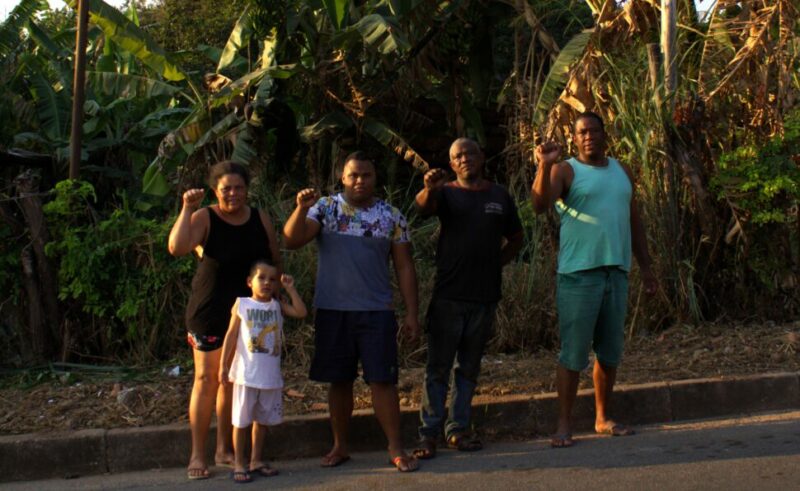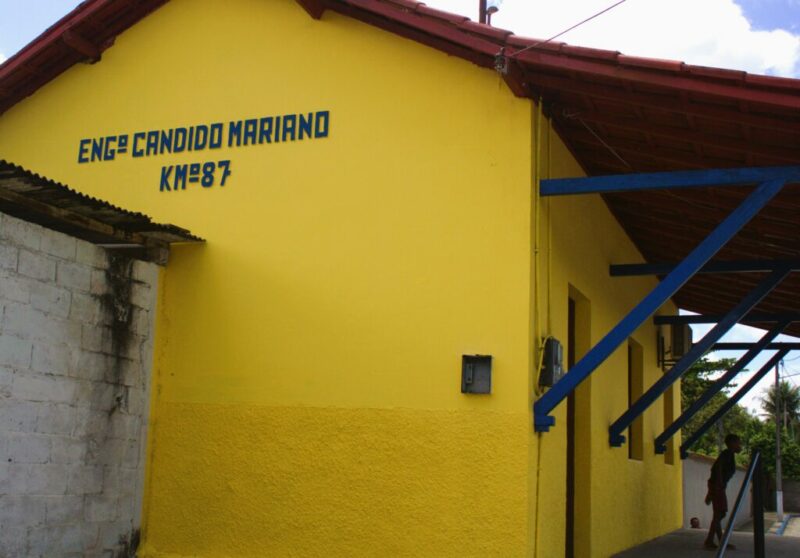
Members of Araújo family, a Quilombola community. Photo by Thais Domingos/Nonada, used with permission.
This article, written by Thais Domingos, was originally published on Nonada's website on January 8, 2024. It is republished here under a partnership agreement with Global Voices, with edits.
The Jardim Brasília neighbourhood is in central Betim, in the metropolitan region of Belo Horizonte city, in Minas Gerais state. A few metres away from the regional hospital is the Familia Araújo Quilombola community, the area’s first urban quilombo.
Historically, quilombos were communities formed by Black people who escaped slavery and resisted the slave regime in Brazil. Today, the name is used for communities of this ethnic origin, who thereby have the ”right to the ownership of their lands and the maintenance of their own culture.” People who live in a quilombo are known as Quilombolas.
The Araújo family has been demanding the right to their land for years. The family of Dona Zulmira and Seu Zé Preto (1937–1995) left the city of Governador Valadares in search of employment and a better life to improve their children's future. They lived in rented huts and even in the outbuildings of an old cemetery. Cleusa Araújo says her parents suffered a lot, working on the bean, rice, sugarcane, and cassava plantations and looking after the land in exchange for housing.
Zé Preto, who worked as a street sweeper, became head of the public sanitation department and received a plot of land, ceded in the 1980s by the local authorities, with an area of 1,800 m² (19375 ft²).
After settling there, the family grew, and another six houses were built, housing children, siblings, grandchildren, and cousins. However, the land had not been properly registered, and, according to family member Alexandre Araújo, in 2017, they were told to leave it.
“Betim's local authorities asked for us to leave. No right to housing, no right to social assistance, no right to resettlement, and no right to compensation. It was not us who were expanding towards the [town] centre; it was the [town] centre that was expanding when we were already here,” he said.
Recognition and reclaiming
During the COVID-19 pandemic, in 2021, a federal law ordered that judicial evictions be suspended, but, in April of the following year, they were reinstated.
”We came here almost 40 years ago, and they wanted us to leave without the right to anything, with nowhere to go,” Cleusa Araújo recalled.
With no security or stability – much of the family is self-employed – they asked for help. Their cause was recognized by leaders in land rights movements, such as Frei Gilvander, a pastoral worker and advisor to the Pastoral Land Commission (CPT) in Minas Gerais.
In bringing together grassroots advocates, social movements, and traditional communities who had heard the story, they saw similarities in the family's situation with the remaining Quilombola communities.
Their community living practices, racial-ethnic identification (all members are of Black and Indigenous descent), subsistence agriculture, and animal husbandry are some of the factors that identify them as a Quilombola community. The Araújos’ land currently has a vegetable plot; the practice of planting and harvesting came from his father, according to Alexandre.
Alexandre Araújo said that, despite the suffering, the process strengthened the family's sense of identity, in having pride in their origins and seeking information about their ancestors.
Speaking to the outlet Nonada Jornalismo, Betim's municipal councillor for the Promotion of Racial Equality, Patrizia Martins, said that “the local authorities had claimed the lands to use for legitimate purposes.”
However, she said that after the public judicial hearings, the family acquired certification, putting an end to the judicial question. “The city authorities respect and understand this right,” she added.
One quilombo recognizes another
About 1.3 million Brazilians identify as Quilombola, according to data from the 2022 Census of the Brazilian Institute of Geography and Statistics (IBGE). Minas Gerais is the state with the third-highest number of Quilombolas in the country. Self-declaration is an important identity marker, as formal recognition of this identity is necessary to guarantee access to constitutional rights.
The initial steps are the technical visits, in which anthropologists, historians, and other legal and cultural experts conduct research to prove that a territory is linked to a traditional community. The process takes into account the location, the relationship with the land, the community's cultural customs, as well as documents and oral accounts.
Patrícia Brito, a specialist in policies on heritage and traditional communities, was one of those in charge of the formal request for land registration for the community.
She said that throughout the process, she had the help of representatives from other Quilombola communities in Belo Horizonte, such as Mangueiras, Souza, and Manzo quilombos. For the researcher, “one quilombo recognizes [another] quilombo,” and so their presence was important in the process.
For the historian and teacher Ana Cláudia Gomes, who also worked on the technical assessment, one of the main barriers to the community's public recognition is racism. When located in an urban area, traditional or marginalized communities suffer from the expropriation of their territories by more economically powerful classes or external bodies.

Old railway station where the Quilombola Association Engenheiro Cândido Mariano is based. Photo by Thais Domingos/Nonada.
The route between Minas and Bahia
Nonada's reporting team travelled about 751 kilometres (467 miles) from Betim to Nova Viçosa, in the far south of Bahia state, to learn about the similarities and differences between the recognition of urban and rural lands. Bahia, the Brazilian state with the most people of African origins, also has the largest number of Quilombolas – 397,059, according to the 2022 census.
Nova Viçosa has 39,509 residents and three officially recognized quilombo communities: Helvécia, Rio do Sul and Engenheiro Cândido Mariano. The latter still carries memories of the a local train station, part of the old Bahia-Minas railway.
The official certification of quilombo Cândido Mariano took place in 2005, according to Adalberto Correia Domingos, who was born there. According to him, one of the biggest challenges in gaining acceptance was the general lack of knowledge about Quilombolas. “We worked a lot on what it meant to be a Quilombola.”
The preparation of the technical study for recognition took place after meetings of community leaders with representatives of the Palmares Cultural Foundation. The main elements looked at were ethnic-racial identity, customs, family farming, cultivation of cassava and beans, and extraction of palm oil, as well as the families’ ancestry and relationship with the land.
Achievements and challenges
After receiving certification from the Palmares Cultural Foundation in 2022, the Araújo family had more positive news: the Public Defender's Office of Minas Gerais got involved, and the eviction order could not go ahead.
Now, the community is hoping to take the final step in guaranteeing their land rights: the registration of the land with the National Institute of Settlement and Agrarian Reform (Incra). According to the Pro-Indigenous Commission of São Paulo, insecurity is very common when dealing with Quilombola rights. Of the 1,971 Quilombola lands in the country, only 171 were granted land titles, as the commission highlighted. The organization's main function is to carry out land planning and implement agrarian reform policies.
While the process is ongoing, we asked Alexandre Araújo what he expects for the future, as the family has young members who can grow up with better knowledge about their own history, as well as of belonging and being recognized as Quilombolas.
“The hope is that the children can grow up having access and rights to education, and I think it's our right to want to get back everything that's been taken away from us,” he said.






